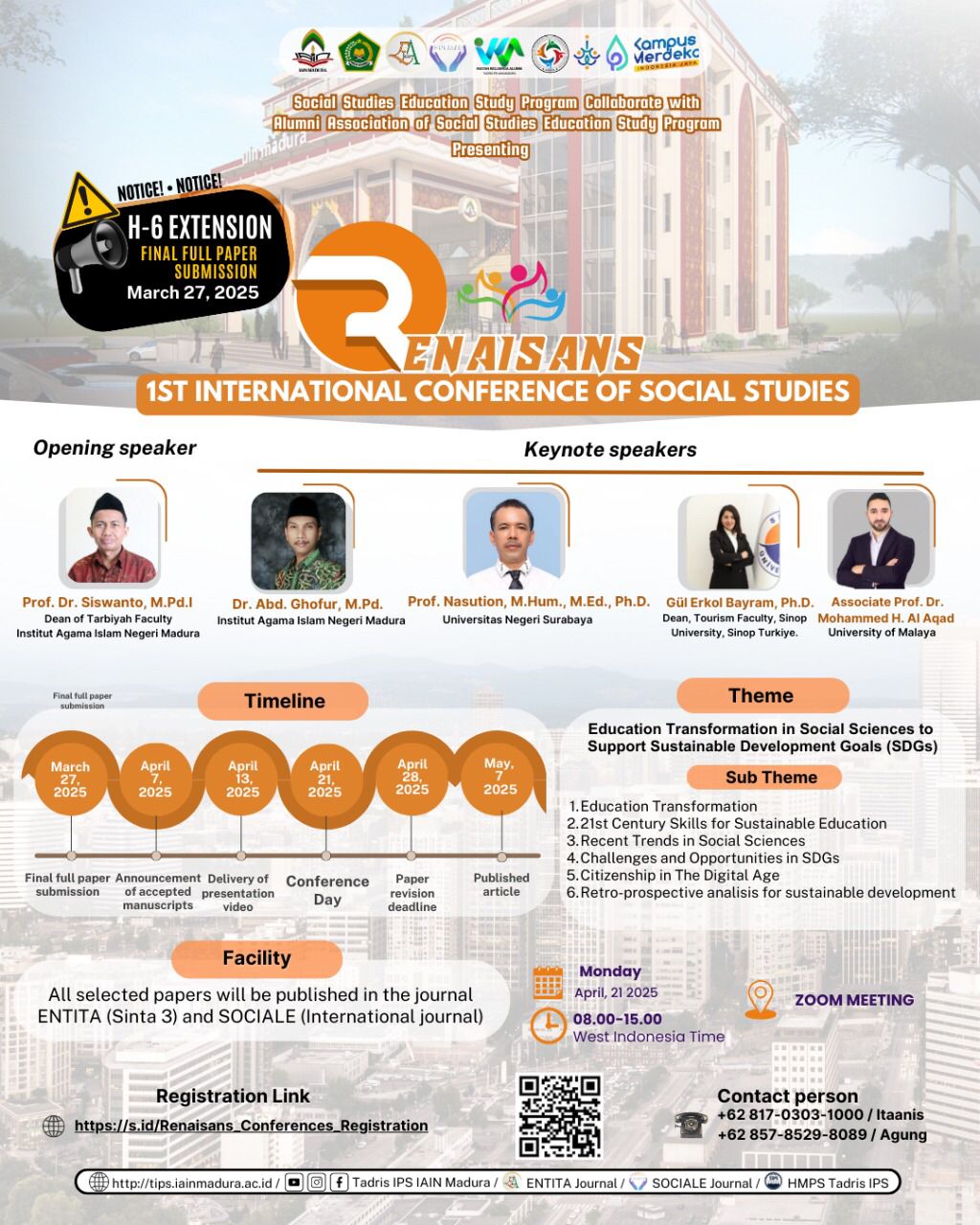Stoikisme dalam Mengatasi Perilaku Agresif Siswa
 Abstract views: 3
,
Abstract views: 3
,
 PDF (Bahasa Indonesia) downloads: 2
PDF (Bahasa Indonesia) downloads: 2
Abstract
This study aims to determine how stoicism overcome the aggressive behavior of students of SMA Negeri 1 Bandongan and how the Harmony of stoicism with the teachings of Islam in overcoming the aggressive behavior of students of SMA Negeri
1 Bandongan. This research uses descriptive-analysis method with qualitative approach and literature review as the main reference source. The results and discussion in this study found there are four (4) main ideas of Stoicism whose values in life are very close to the reality of life and can be used to overcome aggressive behavior in students at SMA Negeri 1 Bandongan, namely (1) dichotomy of control,
(2) premeditatio malorum, (3) amor fati, and (4) memento mori. In addition, based on searches in various literatures, several stoicism philosophical teachings were obtained that have similar concepts to Islamic religious teachings, especially those related to the term happiness of life, namely amor fati and gratitude, qona'ah and a sense of sufficiency. patience and emotional control, sunnatullah and live in nature as well as apatheia and asceticism.
Downloads
References
Annas, M. . & A. S. (2019). Pemikiran Kebahagiaan dalam Tamadun Yunani Klasik
470 S.M-529 M.: Satu Analisis Ringkas. Https://Peradaban.Um.Edu.My/Index.Php/PERADABAN/Article/View/19815, 12(1).
Atkinson, R. L. dan A. I. C. dan H. E. R. (2008). Pengantar Psikologi (Kedelapan).
Erlangga.
Azhar, A. R. T. S. (2018). Titik Temu Antara Islam Dan Filsafat. JURNAL YAQZHAN: Analisis Filsafat, Agama Dan Kemanusiaan, 4(1). https://doi.org/10.24235/jy.v4i1.3193
Fikri, I. (2022, June 6). Stoikisme: 4 Ajaran yang Membawa Ketentraman Dalam Hidup. Https://Www.Babad.Id/Wacana/Pr-3643538064/Stoikisme-4-Ajaran- Yang-Membawa-Ketentraman-Dalam-Hidup.
Firdaus. (2019). Sukur Alhamdulillah. Jurnal Mimbar, 1(20), 26–34. Koeswara. (1998). Agresi Manusia. Erasco.
Linda Yani, A., & Retnowuni, A. (2019). Faktor-faktor yang Mempengaruhi Perilaku Agresif pada Remaja yang Tinggal di Pesantren. Journal of Holistic Nursing Science, 6(1), 36–43. https://doi.org/10.31603/nursing.v6i1.2406
Manampiring, H. (2019). Filosofi Teras. Penerbit Buku Kompas.
Rahman, T., Pertiwi, L., & Batubara, A. (2022). Hakikat Kebahagiaan Hidup: Konsensus antara Al-Qur’an dan Filsafat Stoikisme. Jurnal Riset Agama, 2(3), 151–165. https://doi.org/10.15575/jra.v2i3.19326
Raihanah. (2016). KONSEP SABAR DALAM ALQURAN Raihanah. Tarbiyah Islamiyah, 6(1), 40–51.
Reza A.A Wattimena. (2007). Antara Keutamaan Dan Kepantasan Adam Smith Dan Filsafat Stoa. Melintas, 23(2), 213–237.
Safitri, A. E. & V. N. (2019). Implementasi Pendidikan Karakter pada Pembelajaran IPS di Madrasah Tsanawiyah. Https://Journal.Uny.Ac.Id/Index.Php/Jipsindo/Article/View/24328/Pdf, 6(1).
Shadiq, A. J. (2019). Sikap Asketis Dalam Filsafat Stoisisme Dan Tasawwuf (Studi Komparatif Konsep Apatheia Dengan Zuhud). UIN Sunan Kalijaga .
Sholihat, E. (2018). Qana’ah dalam Perspektif Al-Qur’an. Institut Ilmu Al-Qur’an Jakarta.
Silalahi, U. (2008). Rekonsiliasi Sosial : Satu Kerangka Analisis dari Teori Konsensus. In Jurnal Administrasi Publik (Vol. 5, Issue 2, pp. 193–208). journal.unpar.ac.id/index.php/JAP/article/download/1568/1507
Sofyan S Willis. (2011). Remaja dan Masalahnya Mengupas Berbagai Bentuk Kenakalan Remaja, Narkoba, Free Sex, dan Pemecahannya. Alfabeta.
Solihat, M. (2005). 155839-ID-komunikasi-orang-tua-dan-pembentukan-kep. Jurnal Mediator, 06, 307–312.
Syarifuddin, A., Firtri, H. U., & Mayasari, A. (2021). Konsep Stoisisme untuk Mengatasi Emosi Negatif Menurut Henry Manampiring. Bulletin of Counseling and Psychotherapy, 3(2), 99–104.
Thalib, M. D. (2015). Takdir Dan Sunnatullah (Suatu Kajian Tafsir Maudhu’i). AL- ISHLAH: Jurnal Pendidikan Islam, 13(1), 28–38. http://ejurnal.iainpare.ac.id/index.php/alislah/article/view/486.
Copyright (c) 2025 Entita: Jurnal Pendidikan Ilmu Pengetahuan Sosial dan Ilmu-Ilmu Sosial

This work is licensed under a Creative Commons Attribution-NonCommercial 4.0 International License.
ENTITA: Jurnal Pendidikan Ilmu Pengetahuan Sosial dan Ilmu-Ilmu Sosial operates an Open Access policy under a Creative Commons Non-Commercial 4.0 International license. Authors who publish with this journal agree to the following terms:
- The copyright of the received article once accepted for publication shall be assigned to the journal as the publisher with licensed under a

- Journal is able to enter into separate, additional contractual arrangements for the non-exclusive distribution of the journal's published version of the work (e.g., post it to an institutional repository or publish it in a book), with an acknowledgement of its initial publication in this journal.
- Journal is permitted and encouraged to post their work online (e.g., in institutional repositories or on their website) prior to and during the submission process, as it can lead to productive exchanges, as well as earlier and greater citation of published work (see The Effect of Open Access).
- Here is Copyright Transfer Form that author can download and send to OJS during submission.

















